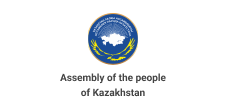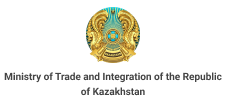Doing a Business

Customs administration
EAEU website: www.eaeunion.org
EEC website: eec.eaeunion.org
Customs Regulation Code https://adilet.zan.kz/eng/docs/K1700000123
New Customs Codes of the Eurasian Economic Union and the Republic of Kazakhstan (Code of the Republic of Kazakhstan dated December 26, 2017 No. 123-VI The Law of the Republic of Kazakhstan "On customs regulation in the Republic of Kazakhstan") entered into force on January 1, 2018.
On April 11, 2017, the stage of signing the Treaty on the Customs Code of the EAEU, which was ratified in the EAEU member states, was completed. The new EAEU Customs Code entered into force after the Eurasian Economic Commission received notifications of ratification of the Treaty from all five EAEU member states (the Russian Federation, the Republic of Kazakhstan, the Republic of Belarus, the Republic of Armenia and the Kyrgyz Republic).
The Code of the Republic of Kazakhstan "On Customs Regulation in the Republic of Kazakhstan" The Code of the Republic of Kazakhstan "On Customs Regulation" (Customs Code) entered into force on January 1, 2018 and includes the norms of the Customs Code of the EAEU, and also establishes legal relations that are within the competence of national legislation. The main difference between the two codes from the previous legislation is a fundamentally new approach to customs regulation. The Customs Code of the Republic of Kazakhstan and the Customs Code of the EAEU entered into force on January 1, 2018.
The new provisions of the Customs Code stipulate that all uncertainties and unresolved issues of customs legislation are accepted in favor of the person who appealed the notification of the results of the customs inspection and notification of the elimination of the violation.

Customs procedures (Article 207 of the Labor Code of the Republic of Kazakhstan)
Depending on the purposes of finding and using goods in the customs territory of the Eurasian Economic Union, their export from the customs territory of the Eurasian Economic Union and (or) finding and using them outside the customs territory of the Eurasian Economic Union, the following 17 customs procedures are applied to goods:
- output for domestic consumption;
- export;
- customs transit;
- bonded warehouse;
- processing in the customs territory;
- processing outside the customs territory;
- processing for domestic consumption;
- free customs zone;
- free warehouse;
- temporary import (admission);
- temporary export;
- re-import;
- re-export;
- free trade;
- destruction;
- refusal in favor of the state;
- special customs procedure.
- to complete the customs procedure under which the goods are placed;
- to suspend the customs procedure under which the goods are placed;
- for transportation (transportation) of goods through the customs territory of the Eurasian Economic Union and (or) for transportation from one part of the customs territory of the Eurasian Economic Union to another part of the customs territory of the Eurasian Economic Union through the territories of states that are not members of the Eurasian Economic Union and (or) by sea in accordance with this Code.

Declarant (Article 149 of the Labor Code)
1. Declarants of goods placed under customs procedures may be:
1) a person of a member state of the Eurasian Economic Union:
being a party to a transaction with a foreign person, on the basis of which goods are moved across the customs border of the Eurasian Economic Union;
on behalf of and (or) on whose behalf the transaction is concluded, specified in paragraph two of this sub-clause;
having the right to own, use and (or) dispose of goods - if goods are moved across the customs border of the Eurasian Economic Union not within the framework of a transaction, one of the parties to which is a foreign person;
being a party to a transaction concluded with a foreign person or with a person of a member state of the Eurasian Economic Union in relation to foreign goods located in the customs territory of the Eurasian Economic Union;
being a forwarder - when declaring the customs procedure for customs transit;
being a party to a transaction concluded between persons of one member state of the Eurasian Economic Union, on the basis of which goods are exported from the customs territory of the Eurasian Economic Union;
2) foreign person:
which is an organization that has a representative office, a branch, created and (or) registered in the territory of a member state of the Eurasian Economic Union in the prescribed manner, - when customs procedures are declared only in relation to goods moved for the own needs of such a representative office or branch;
being the owner of the goods, if the goods are moved across the customs border of the Eurasian Economic Union not within the framework of a transaction between a foreign person and a person of a member state of the Eurasian Economic Union;
having the right to own and use goods, if goods are moved across the customs border of the Eurasian Economic Union not within the framework of a transaction between a foreign person and a person of a member state of the Eurasian Economic Union, - upon declaration of the customs procedure of a customs warehouse, customs procedure for temporary import (admission), customs procedure re-export, special customs procedure;
3) diplomatic missions, consular offices, representations of states to international organizations, international organizations or their representations, other organizations or their representations located in the customs territory of the Eurasian Economic Union;
4) a carrier, including a customs carrier, - upon declaration of the customs procedure for customs transit;
5) a foreign person who has received, in accordance with an international treaty of a member state of the Eurasian Economic Union with a third party, a document provided for by such an international treaty, granting such a person the right to export goods from the customs territory of the Eurasian Economic Union, located in the customs territory of the Eurasian Economic Union, - when declaring the customs procedure of a customs warehouse, customs procedure for re-export, customs procedure for export;
6) a foreign person with a branch registered in the Republic of Kazakhstan as a taxpayer in accordance with the tax legislation of the Republic of Kazakhstan.

Customs payments and taxes (Article 74 of the Labor Code of the Republic of Kazakhstan)
Customs payments and taxes include:
- import customs duty;
- export customs duty;
- value added tax levied on the import of goods into the customs territory of the Eurasian Economic Union;
- excise (excise) levied (levied) upon the import of goods into the customs territory of the Eurasian Economic Union;
- customs duties.
- with regard to customs duties - the Treaty on the Union, the customs legislation of the Eurasian Economic Union and (or) the Republic of Kazakhstan (https://adilet.zan.kz/eng/docs/Z1400000240;
- in relation to value added tax and excise taxes levied by customs authorities when goods are moved across the customs border of the Eurasian Economic Union - this Code and the tax legislation of the Republic of Kazakhstan.

Types of rates of customs duties (Article 75 of the Labor Code of the Republic of Kazakhstan)
Customs duty rates are subdivided into the following types:
- ad valorem, established as a percentage of the customs value of taxable goods;
- specific, established depending on physical characteristics in kind (quantity, mass, volume or other characteristics);
- combined, combining the types specified in subparagraphs 1) and 2) of this article.

Customs duties
Customs duties are obligatory payments levied for the performance by customs authorities of customs operations related to the release of goods, customs escort of vehicles, as well as for the commission of other actions established by this Code.
The rates of customs duties are established by the Government (Resolution of the Government of the Republic of Kazakhstan dated April 5, 2018 No. 171 "On approval of the rates of customs duties levied by state revenue authorities").
The amount of customs fees cannot exceed the approximate cost of the costs of customs authorities for actions in connection with which customs fees have been established.
Payers of customs fees, types, terms and procedure for payment of customs fees, collection and offset (return), benefits for payment of customs fees, as well as cases when customs fees are not paid are established by this Code.

Customs documents (Article 9 of the Labor Code of the Republic of Kazakhstan)
Customs documents are filled out in Kazakh or Russian, unless otherwise provided by the Customs Code.
Customs documents filled in on the territory of one member state of the Eurasian Economic Union and subject to submission to the customs authorities of another member state of the Eurasian Economic Union when performing customs operations are filled out in Russian

TN VED coding (Article 19 of the Customs Code of the EAEU)
The Unified Commodity Nomenclature of Foreign Economic Activity of the Eurasian Economic Union is a system for describing and coding goods that is used to classify goods in order to apply customs -tariff regulation, export customs duties, prohibitions and restrictions, measures to protect the internal market, customs statistics.
The commodity nomenclature of foreign economic activity can be used for the purposes of taxation of goods and for other purposes stipulated by the customs legislation of the Eurasian Economic Union and (or) the Republic of Kazakhstan, as well as other legislation of the Republic of Kazakhstan.
The international basis of the Commodity Nomenclature of Foreign Economic Activity is the Harmonized System of Description and Coding of Goods of the World Customs Organization and the unified Commodity Nomenclature of Foreign Economic Activity of the Commonwealth of Independent States.
The commodity nomenclature of foreign economic activity is approved by the EAEU Commission.
Explanations to the Commodity Nomenclature of Foreign Economic Activity are adopted by the EAEU Commission.
The classification of goods is understood as the gradual assignment of the goods under consideration to specific headings, subheadings and subheadings on the Commodity Nomenclature of Foreign Economic Activity.
The classification of goods is carried out based on the main criteria:
- the function that the product performs;
- the material from which the product is made.
The declarant and other persons carry out the classification of goods in accordance with the Commodity Nomenclature of Foreign Economic Activity during customs declaration and in other cases when, in accordance with the customs legislation of the Eurasian Economic Union and (or) the Republic of Kazakhstan, the customs authority is declared a product code in accordance with the Commodity Nomenclature of Foreign Economic Activity.
At the request of persons, the customs authorities may classify goods prior to their customs declaration by making preliminary decisions on the classification of goods in accordance with the Commodity Nomenclature for Foreign Economic Activity and decisions on the classification of goods transported across the customs border of the Eurasian Economic Union in an unassembled or disassembled form, including incomplete or incomplete form.

Rates of customs duties and taxes for calculation (Article 53 of the Customs Code of the EAEU)
To calculate import customs duties, the rates of the Common Customs Tariff of the Eurasian Economic Union are applied, except for the cases provided for in accordance with the Treaty on the Union, as well as when, in accordance with international treaties within the Eurasian Economic Union or international treaties of the Eurasian Economic Union with a third party, for calculation import customs duties are applied at rates different from the rates of the Unified Customs Tariff of the Eurasian Economic Union.
If the conditions for granting tariff preferences are not met for calculating import customs duties, the rates of the Unified Customs Tariff of the Eurasian Economic Union are applied, unless otherwise provided by the Treaty on the Union.
To calculate export customs duties payable in the Republic of Kazakhstan, the rates established by the authorized body in the field of regulation of trade activities are applied, unless otherwise established by international treaties within the framework of the Eurasian Economic Union and (or) bilateral international treaties of the Republic of Kazakhstan.
For the calculation of taxes payable in the Republic of Kazakhstan, the rates established by the tax legislation of the Republic of Kazakhstan are applied.
The Commission forms a general list of tax rates applicable to goods in the member states of the Eurasian Economic Union, based on information provided by authorized state bodies of the member states of the Eurasian Economic Union, and posts it on the official website of the Eurasian Economic Union.
The format of the general list of tax rates applied to goods in the member states of the Eurasian Economic Union, the procedure for its formation, maintenance and use of information from it, as well as the procedure and technical conditions, including the structure and format, submission of information about such rates are determined by the Commission.

























